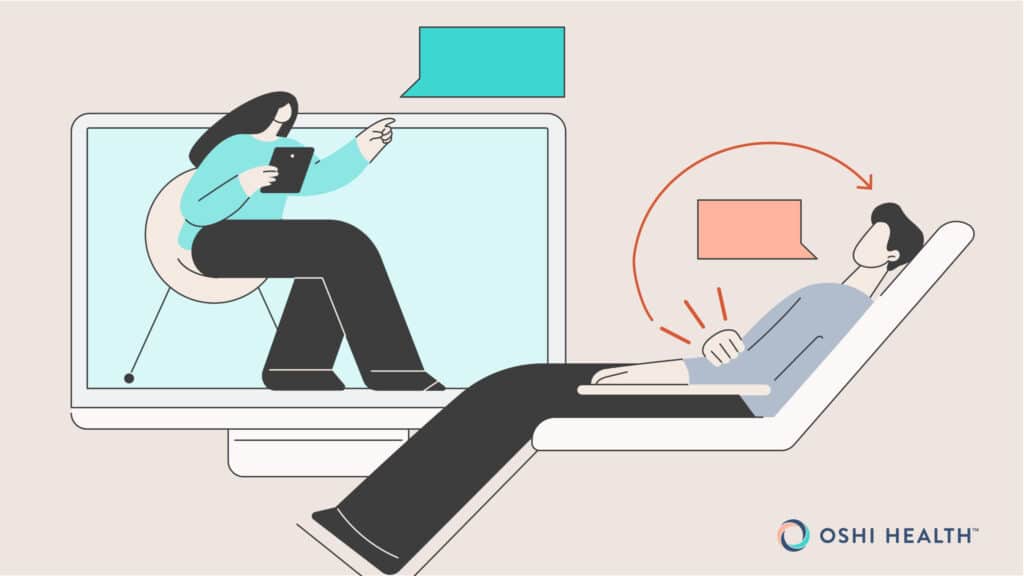Crohn’s disease is an inflammatory bowel disease (IBD) involving chronic inflammation of the gastrointestinal (GI) tract. Crohn’s can affect any part of your digestive system but commonly affects the small intestine.
Read on to learn about Crohn’s disease symptoms, causes, risk factors, and complications—and how we can help you find relief.
Crohn’s disease symptoms
Wondering if your symptoms might be Crohn’s or looking to better understand your condition? Let’s explore some of the signs of Crohn’s disease and get you the answers you need, whether you’re newly concerned or already have a diagnosis.
Diarrhea is one of the most common Crohn’s disease symptoms. Your symptoms may vary depending on the affected parts of your digestive tract.
Symptoms can also come and go, with periods of remission between flare-ups. Crohn’s symptoms can also get worse during your period—adding an extra layer of discomfort to what can be an already challenging time of the month for some.
Other symptoms of Crohn’s disease include:
- Abdominal cramping or pain
- Urgent bowel movements
- Weight loss
- Anemia
- Fatigue
- Fever
- Joint pain or soreness
- Eye redness, discomfort, or pain
- Nausea
- Loss of appetite
- Painful red bumps on the skin
Living with Crohn’s symptoms can be uncomfortable, but it’s important to know that you’re not alone. In fact, experts estimate that over 2.3 million adults in the U.S. have an IBD diagnosis like Crohn’s—and that doesn’t account for those who live with symptoms but have yet to seek help.
At Oshi Health, our GI specialists, including GI providers, registered dietitians, and gut-brain specialists, work together to address your Crohn’s disease symptoms.
An integrated team of GI specialists, working together for you
Our expert gastroenterologists, GI providers, registered dietitians, and gut-brain specialists are leaders in their fields, with advanced education and training in gastroenterology. Our comprehensive team approach is personalized to meet your unique needs and address the root cause of your symptoms.
Learn more about our whole-person approach by reading Justin’s Oshi Health experience.
Crohn’s disease causes
It’s unclear exactly what causes Crohn’s disease in some people but not others, but evidence suggests an interaction between the following may be at play:
- Your genetics. Certain genes might increase the chances of developing Crohn’s. Your risk of developing Crohn’s disease is higher if a first-degree family member (parent or sibling) also has a form of IBD.
- Your immune system. Crohn’s disease may involve an abnormal immune response—possibly triggered by certain gut microbes, causing the body to mistakenly attack cells in the digestive tract. This causes gut inflammation that leads to uncomfortable GI symptoms.
- Your environment. Researchers are also looking into how the world around you might interact with your unique genetic makeup, gut microbiome, and immune system to trigger conditions like Crohn’s.
And while stress isn’t a known Crohn’s disease cause, research suggests stress (hello, gut-brain connection) can increase gut inflammation and worsen your symptoms.
Crohn’s disease risk factors
Just because you have a risk factor doesn’t mean you’re destined to get Crohn’s disease, but it can mean you’re more likely to develop the condition than someone else.
Crohn’s disease risk factors include:
- Being a smoker
- Having a parent or sibling with an inflammatory bowel disease (IBD)
- Being younger than 35 (the typical age range when IBD gets diagnosed—but some people go longer without getting a diagnosis and onset can happen at any age)
- Being Caucasian, especially of Ashkenazi (Eastern European) Jewish descent, though Crohn’s can affect people of all ethnicities
- Taking nonsteroidal anti-inflammatory drugs (NSAIDs), which can also worsen Crohn’s
Where you live may also play a role in Crohn’s disease since it’s more likely to affect people living in northern climates, high-income countries, and big cities.
Crohn’s disease complications
Before we dig into this scary stuff, we want to make sure you know that just because you have Crohn’s disease doesn’t mean you’ll develop complications. Seeking treatment for your Crohn’s disease and managing your symptoms can make you less likely to experience serious side effects.
Over time, untreated Crohn’s disease can damage the lining of your GI tract, leading to serious Crohn’s complications like:
- Abscesses. Chronic inflammation can cause painful, pus-filled abscesses in the lining of your GI tract.
- Anal fissures. Crohn’s can affect any part of your GI tract, from your mouth to your anus. Anal fissures are small tears in tissue that can lead to pain, itching, and bleeding.
- Fistulas. Over time, chronic inflammation can eat away at the lining of your intestines, creating holes known as fistulas, which can become infected.
- Inflammation outside the GI tract. Crohn’s inflammation starts in your GI tract but left untreated, it can eventually lead to eye, skin, and joint symptoms.
- Intestinal obstructions. Crohn’s can also thicken the lining of your intestines, potentially causing blockages and preventing stool from moving through your GI tract.
- Strictures. Recurrent inflammation can cause narrowing of the colon known as strictures, which can also lead to blockages.
- Anemia. Crohn’s can cause bleeding and inflammation, which can lead to a red blood cell deficiency known as anemia.
- Dehydration. Frequent severe diarrhea can lead to dangerous dehydration that may require intravenous (IV) rehydration in the hospital.
- Developmental problems. In kids, Crohn’s can impact growth and even delay puberty—which is why it’s commonly diagnosed before most people hit their 30s.
- Osteopenia or osteoporosis. Both Crohn’s and certain Crohn’s treatments, like corticosteroids, can impact bone health.
- Blood clots. Having Crohn’s can put you at a higher risk of developing blood clots.
- Nutrient deficiencies. If you have Crohn’s, your body may have trouble absorbing nutrients, eventually leading to deficiencies in iron, B12, and vitamin D and weight loss.
- Ulcers. Inflammation can also cause ulcers to form anywhere along your digestive tract.
- C. difficile infection. A bacterial infection that can cause symptoms similar to IBD flares.
Having Crohn’s disease may also increase your risk of developing colorectal cancer—the risk is higher with untreated Crohn’s.
Read more about this link in our blog: How IBD affects your colorectal cancer risk.
Curious about your colon cancer screening options? Connect with an Oshi Health GI specialist to find out which screening option is right for you.
Crohn’s disease diagnosis
The first step toward a Crohn’s disease diagnosis is a thorough medical history. At Oshi Health, which is in-network with most major health plans, our GI specialists consider the whole you when working together to make a diagnosis, including your medical history, symptoms, and lifestyle.
In-network with most major health plans
Unlike traditional healthcare providers, we don’t bill on a per visit basis. With insurance coverage, most Oshi Health patients get a year of unlimited care and only pay for four in-network specialist visits. For those four visits, copays and deductibles apply based on your plan benefit details

Your provider will ask you questions about your symptoms, like when they started, how often and when they typically occur, or whether certain foods or behaviors tend to trigger flares.
They’ll also consider the following:
- Your diet and potential trigger foods
- Lifestyle habits
- Medications or supplements you’re taking or have already tried for your symptoms
- Stress and behavioral health
- Previous surgeries or medical procedures
- Your family history
And while you don’t need to have had previous testing to meet with an Oshi provider and benefit from our integrated GI care, your provider will review previous testing you’ve gone through, if any.
They may also recommend additional testing if you have a combination of risk factors, like a family history of colorectal cancer, or serious symptoms like:
- Blood in your stool or vomit
- Unexplained weight loss
- Fever
- Diarrhea at night
- Severe or persistent abdominal pain
Further testing might include:
-
Your provider may order blood tests for Crohn’s disease to check for:
- Low red blood cell count, which may indicate anemia and potential bleeding in the GI tract
- Higher-than-typical white blood cell count, which may indicate inflammation or infection - Taking a closer look at your poop can’t diagnose Crohn’s disease, but it can help rule out other digestive conditions with similar symptoms.
-
An intestinal endoscopy for Crohn’s disease involves using a small tube with a very small camera (endoscope) to visualize parts of your GI tract. Depending on your symptoms, your provider may order one or more of the following:
- Colonoscopy. During this procedure, a healthcare professional examines your rectum and colon for signs of Crohn’s disease. Upper GI endoscopy. During this procedure, a healthcare professional examines your esophagus, stomach, and duodenum for signs of Crohn’s disease.
- Enteroscopy. A healthcare professional examines your small intestine for signs of Crohn’s disease during this procedure.
- A newer, less invasive endoscopy procedure, capsule endoscopy, requires you to swallow a capsule containing a tiny camera. This allows healthcare professionals to view the inside of your digestive tract via a wearable receiver. - Imaging studies, such as a This type of imaging uses X-ray and computer technology to produce images of your GI tract. In some cases, you may need to drink a solution and receive a contrast dye infection to produce clearer images of the inside of your body.
While some forms of testing, like a colonoscopy, might be necessary for diagnosis, we try to avoid putting you through unnecessary and repeat testing. If our providers recommend diagnostic or other testing, we take a concierge approach to help you find a convenient and in-network location.
- decrease in unnecessary (and expensive) procedures and tests
- of undiagnosed patients get a clear diagnosis within 3 months
- of patients report better quality of life, with less stress and anxiety, within 3 months
Source: Results of a clinical trial conducted in partnership with a national health plan
Crohn’s disease treatment
We take a comprehensive approach to Crohn’s disease treatment, by treating the disease and addressing diet and lifestyle factors that can contribute to symptom flare-ups.
Here’s how our providers work together to put you on a path to better digestive health:
Prescribing or recommending medications
Medications are often part of personalized treatment plans for Crohn’s disease at Oshi Health.
Your provider will recommend medications based on disease severity and location, and other factors unique to you.
The following prescription medications may help relieve symptoms during a Crohn’s flare and prevent future flares:
- Oral steroids. These medications help calm your immune system and limit inflammation, helping with moderate to severe symptoms of Crohn’s. Because steroids come with side effects, they’re not ideal for long-term use.
- Aminosalicylates. These medications help control inflammation. They’re typically recommended for people with mild disease, and are more effective at treating ulcerative colitis than Crohn’s.
- Immunomodulators. Like steroids, these medications help control your body’s immune activity, limiting the inflammation that triggers Crohn’s symptoms.
- Biologics. These medications neutralize specific proteins produced by your immune system to help reduce inflammation.
- Targeted synthetic small molecules. These medications target parts of the immune system to decrease inflammation. They’re prescribed to treat moderate to severe Crohn’s disease.
- Surgery. People with severe symptoms or complications from Crohn’s who haven’t seen success with other treatments may benefit from surgery.
Your provider can also prescribe medications to help manage uncomfortable symptoms, like mild pain. They can also recommend supplements to prevent or treat nutritional deficiencies related to Crohn’s.
Medications are just one piece of the journey to symptom relief. Our whole-person approach to GI care also looks at lifestyle factors such as diet and stress that may be contributing to symptom flares.
Identifying triggers & making dietary and lifestyle adjustments
What does your typical diet look like? Do you have dietary triggers that seem to cause flares or make your symptoms worse?
What you eat can’t cause Crohn’s disease, but some foods can aggravate symptoms. Our registered dietitians can help you identify your Crohn’s-trigger foods and find ways to modify your diet without necessarily giving up the foods you love.
Your diet might look different depending on whether you’re in a flare or remission. Our RDs offer personalized recommendations based on your unique needs to make sure you’re well-nourished.
Depending on what triggers Crohn’s flares for you, management might also involve:
- Focusing on increasing your soluble fiber intake to ease diarrhea
- Eating smaller, more frequent meals
- Chewing more thoroughly to reduce your risk of bowel obstruction
- Limiting FODMAPs in your diet
- Incorporating a GI-gentle diet when you’re experiencing a flare
Working on the gut-brain connection
Did you know your brain and digestive system are in constant communication? It’s why you might feel butterflies in your stomach when you experience heightened emotions like stress or excitement.
The close link between your gut and mind can also play a role in conditions like Crohn’s disease.
Living with a chronic condition like Crohn’s can be incredibly stressful. Stress can actually make your symptoms worse, creating a vicious cycle where stress and GI discomfort feed off each other.
Our gut-brain specialists can help you identify potential stress-related triggers causing excess inflammation that leads to symptom flares. They can also help you cope with the emotions that come hand in hand with living with a chronic condition.
Gut-brain specialists are trained and licensed behavioral health professionals with specific experience treating GI concerns like Crohn’s disease. Working alongside GI providers and registered dietitians, they can help you take control of your symptoms by providing you with the skills and tools to cope with distressing thoughts, feelings, and physical reactions that may be contributing to GI distress.
This might include:
- Relaxation strategies to manage stress, including diaphragmatic breathing exercises, mindfulness meditation, and exercise
- Cognitive behavioral therapy (CBT) for GI symptoms to help you better cope with negative emotions relating to your condition, including feelings of embarrassment and shame
- Acceptance and commitment therapy (ACT) for GI conditions to move towards a place of acceptance and identify the ways you might be avoiding certain situations, which could make it more challenging to cope with symptoms
Oshi Health gut-brain specialists are here to support you as you navigate living with a chronic digestive health condition, helping to normalize and validate your GI-related concerns—so you never feel alone in your journey to symptom relief.
Whole person care for Crohn’s disease
At Oshi, no two treatment plans are the same.
Our GI specialists work together to create a personalized treatment plan to address the root cause of your symptoms. We consider the whole you—not just your Crohn’s diagnosis. That means taking into account diet, lifestyle, and the gut-brain connection, ensuring you get the individualized care you need.
Already seeing a GI provider? We can provide support between visits and work with your existing gastroenterologist as an extension of your care.
Oshi is your partner in digestive health
Feel like your digestive concerns are running your life? You’re not alone—and we’re here to help you live well, even with Crohn’s disease.
Oshi Health GI providers, gut-brain specialists, and registered dietitians work together to address the root cause of your symptoms and find solutions that actually work for you:
✔ Personalized care plans tailored to your lifestyle
✔ Science-backed strategies to calm your gut
✔ Compassionate, whole-person care
✔ And so much more!
Ready to take control of your gut health?
Frequently asked questions
-
What you eat doesn’t cause Crohn’s disease, but some foods can aggravate symptoms.
Not everyone with Crohn’s disease will have the same trigger foods. Examples of foods that may worsen symptoms include:
- Foods high in insoluble fiber, like whole grains and bran
- Fatty foods
- Dairy products, if you’re lactose intolerant
- Corn
- Carbonated drinks
- Coffee, tea, chocolate
- Alcohol
- Foods that can trigger excess gas, like beans, broccoli, onions, and cabbage
- Raw fruits and vegetables
- Spicy foods
Working with a registered dietitian can help you identify trigger foods and manage uncomfortable flare-ups.
-
Living with Crohn’s disease can be unpredictable, with periods where you’re feeling fine and periods where symptoms flare up. During a flare-up, you might experience low energy, a frequent need to visit the bathroom, and pain or discomfort in your abdomen that feels crampy—all of which can seriously impact your quality of life.
-
It sounds like a cute name, but Crohn’s belly actually refers to uncomfortable belly bloating and swelling that can occur during a flare-up. And bloating doesn’t just cause physical discomfort. It can impact your ability to enjoy social activities and even take a toll on your mental health.
Last medically reviewed July 2024







